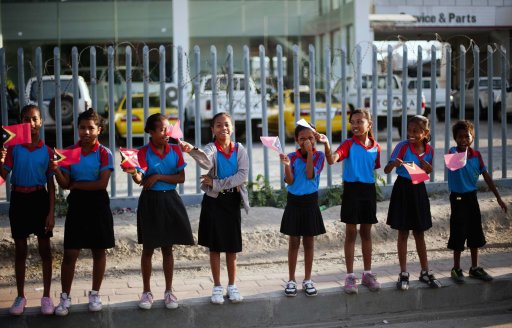Mme. Secretary is wheels down in Timor Leste. Here is a cute picture of children greeting her motorcade.

- School
children wave flags and cheer as U.S. Secretary of State Hillary
Clinton's motorcade passes through a street in Dili September 6, 2012.
Clinton, who is in East Timor for talks, is visiting the nation for the
first time. REUTERS/Jim Watson/Pool (EAST TIMOR - Tags: POLITICS
EDUCATION)
A senior State Department official gave a
press briefing en route about her goals for this visit, the first by a
secretary of state in ten years. Here is the background provided.
Background Briefing by Senior State Department Official on Timor Leste
Special Briefing
Senior State Department Official
En Route to Dili, Timor-Leste
September 6, 2012
MODERATOR:
We are en route from Beijing to Dili. Here to talk a little bit about
what the Secretary hopes to accomplish in Timor Leste is [Senior State
Department Official], hereafter Senior State Department Official. Go
ahead, [Senior State Department Official].
SENIOR STATE DEPARTMENT OFFICIAL: I’ll just go quickly, you guys – then if you have any particular questions.
So
you’ve read some of the background on Timor Leste. This is the first
Secretary of State to visit in the 10 years since Timor has become
independent. Its birth pangs were very violent 10 years ago as it broke
away from Indonesia. And it – the set of circumstances by which Timor
became independent was the leadership in Indonesia suggesting that they
would be prepared for a referendum to allow this to take place.
When
it was clear that Timor preferred independence, there was a spasm of
violence. The UN, others, were deeply involved. The Australians and the
New Zealanders played a very important role in trying to bring stability
in the immediate aftermath. It was one of the largest projects of the
United Nations, of ASEAN and others over the course of the last 10
years, and the United States has been deeply involved in the
nation-building project there.
The country has just experienced a
successful election. It – we’ll have a chance, the Secretary will have a
chance, to speak with both the President and the Prime Minister. It, as
you know, is a former Portuguese colony, so it has remarkably little
infrastructure. It has some substantial disadvantages: very little
transportation, very little in the way of infrastructure, and almost no
capacity for English. So it’s a country that the very elite speak --
QUESTION: (Off-mike.)
SENIOR STATE DEPARTMENT OFFICIAL: Pardon me?
QUESTION: (Inaudible) capacity for what?
MODERATOR: For English.
QUESTION:
English – not very much capacity for English. So the very elite speak
Portuguese, which is not as common in ASEAN and elsewhere. A very small
group of people speak English. And then there are a whole host of ethnic
languages overall. So one of the biggest efforts underway in ASEAN is
to try to build sort of a younger group of people that have English
capacity.
You’ll be struck that, when you arrive there, there’s a
lot of new building. Much of that building, again, has been brought
either by international organizations or China. One of the few areas
where the United States and China have actually worked quite well
together in terms of joint projects has been in Timor. I think we have
been a strong supporter of Timor ultimately being embedded in an
institution like ASEAN. But to date, many ASEAN countries are not
supportive of that yet because they’re essentially quite weak and they
have a long road to go overall.
When we’re there, we’re going to
have a chance to, obviously, congratulate them on their – both their new
election and their 10-year anniversary. We’re going to go out to a
coffee plantation. One of the areas where the country has really started
to come back is in the coffee plantation, coffee growing. They work
very closely with Starbucks and a couple other coffee chains. You’ll get
a chance to sample some of the – it is a very distinctive, very rich
coffee grown into the hills there.
I think Timor is still plagued
by substantial violence. And we have a number of programs to support the
country as a whole, but it does have a long way to go. And its
relationship with Indonesia is still complicated. And others in ASEAN
want them to be on a slower path towards joining the organization as a
whole.

